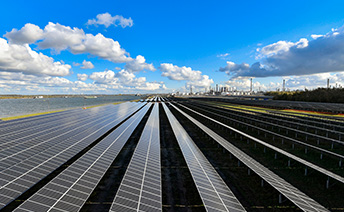Chamber of Minerals and Energy of Western Australia (CME)
CME represents mining and energy companies in Western Australia, including those producing coal and other mineral resources alongside oil and gas.[1]
Membership of board/executive committee: None. Shell is a member of the executive council (which has a consultative role) but is not a member of the executive committee (which manages the activities of CME).
- 2022 assessment outcome: Some misalignment
- 2021 assessment outcome: Some misalignment
Summary
Shell benefits from its membership of CME, including its advocacy on issues relating to environment, climate, economic competitiveness, skills development, health and safety, infrastructure and land access.
We have found CME to have some misalignment with our climate and energy transition-related policy positions.
We will urge CME to:
- Support reducing methane emissions throughout the natural gas supply chain through direct regulations such as performance standards based on robust monitoring, reporting and verification frameworks. Support ending routine flaring by 2030 or sooner to help achieve such standards.
We will encourage CME to:
- Explicitly state support for putting a direct price on carbon emissions as part of a broader policy framework to achieve net-zero emissions.
- Support ending approval of investments in new unabated coal power generation. Support phase-out of unabated coal power generation by 2040, where feasible.
- Support accelerating electrification using renewable and low-carbon power sources.
We will remain a member of CME at the current time. We will continue to track alignment between CME’s climate and energy transition-related positions and our own and will be transparent about where we find differences. We will continue to engage the association in areas where we have different views.
Further information
Click on the sections below to read more.
- CME has stated support for the temperature goal of the Paris Agreement.[2]
- CME has stated support for achieving net-zero emissions “as soon as possible and no later than 2050”.[3]
- In its 2022 submission to the Safeguard Mechanism (SGM) Reforms consultation, CME stated its support for “the intent of the SGM reforms which are aimed at contributing to the commitment made by the Australian government in June 2022 to reduce national emissions to 43 percent below 2005 levels by 2030 […] and achieve net zero emissions by 2050.”[4]
- CME has stated support for a “transparent price signal across the whole economy and promotion of lowest cost abatement, leveraging existing mechanisms where possible, and appropriately considering the international competitiveness of trade exposed industries”.[5] CME has not stated an explicit position in support of carbon pricing.
- In its 2022 submission to the Safeguard Mechanism (SGM) Reforms consultation, CME stated it supported the intent of the reforms. It also stated it considers “it is critical that the SGM (and supporting policy) reforms place a strong emphasis on enabling and incentivising the uptake of new low emissions technologies in WA to contribute to Australia’s revised emission reduction ambitions while ensuring the sector remains globally competitive.”[6] It also stated “CME supports reforms that are aimed at promoting low-cost, genuine abatement.”[7]
- In response to the federal government’s 2022 Australian Resources Plan, CME stated support for the [previous] Australian government’s commitment to no new mining or carbon taxes.[8]
- CME has stated that it will advocate for government-coordinated approaches that ensure investment in a “broad range of technologies”, including energy efficiency.[9]
- CME has stated support for competitive decarbonised hydrogen in Western Australia.[10] In November 2021, CME published a report titled “Towards Competitive Clean Hydrogen”. The report states that CME members are pursuing a range of projects that cut across various hydrogen technologies but are united by the need for these production technologies to be “aligned with climate goals”.[11]
No position
- CME has stated that it will advocate for government-coordinated approaches that ensure investment in carbon sequestration technologies.[12]
- In 2022, it was reported that CME supported the reform of Western Australia’s Greenhouse Gas Storage and Transport Bill, which aims to enable the energy and resource industries to decarbonise through carbon capture and storage (CCS).[13]
- CME has stated support for carbon emissions reporting, notably through the National Greenhouse and Energy Reporting (NGER) scheme. It has not stated a position on broader ESG reporting.
- CME is a member of the Minerals Council of Australia, which has adopted the “Towards Sustainable Mining” framework “to help companies responsibly manage ESG performance and drive continual improvement”.[14]
- In 2022, CME stated that the State Government’s announcement that its coal-fired Muja and Collie power stations would be retired by 2030, “was another step in the ongoing transition of Collie to a more diversified, non-traditional economy”.[15]
- CME has stated support for maintaining a “secure, stable and reliable energy supply” and that “ensuring the rapid introduction of intermittent renewable generation does not present a risk to the system.”[16]
- In its November 2021 press release about the development of the Scarborough gas field, CME’s Chief Executive stated: “We view gas as a vital transition fuel on the pathway to decarbonisation.”[17]
- CME has not stated a public position in support of direct regulation of methane emissions or ending routine flaring by 2030 or sooner.
No position
No position
- In its 2022 submission to the Safeguard Mechanism (SGM) Reforms consultation, CME stated that it “recognises the important role that energy and minerals play in the transition to net-zero” and that “It is therefore vital that policy supports the cost-effective transition for both existing and future facilities to ensure they remain globally competitive.”[18]
No position
No position
[1] https://www.cmewa.com.au/about/members/
[2] https://www.cmewa.com.au/policy-advocacy/policy-areas/climate-change/
[3] https://www.cmewa.com.au/policy-advocacy/policy-areas/climate-change/
[4] https://consult.dcceew.gov.au/safeguard-mechanism-reform-consultation-paper/submission/view/163
[5] https://www.cmewa.com.au/policy-advocacy/policy-areas/climate-change/
[6] https://consult.dcceew.gov.au/safeguard-mechanism-reform-consultation-paper/submission/view/163
[7] https://consult.dcceew.gov.au/safeguard-mechanism-reform-consultation-paper/submission/view/163
[8] https://www.cmewa.com.au/media-release/articles/cme-welcomes-announcement-of-australian-resources-plan/
[9] https://www.cmewa.com.au/policy-advocacy/policy-areas/climate-change/
[10] https://www.cmewa.com.au/reports/toward-competitive-clean-hydrogen/
[11] https://www.cmewa.com.au/reports/toward-competitive-clean-hydrogen/
[12] https://www.cmewa.com.au/policy-advocacy/policy-areas/climate-change/
[13] https://www.mediastatements.wa.gov.au/Pages/McGowan/2022/03/Draft-Bill-to-help-WAs-resources-industry-reduce-emissions.aspx
[14] https://www.minerals.org.au/towards-sustainable-mining
[15] https://www.cmewa.com.au/safer-smarter-cleaner/articles/from-a-coal-mine-to-a-world-class-recreational-lake/
[16] https://www.cmewa.com.au/policy-advocacy/policy-areas/infrastructure/
[17] https://www.cmewa.com.au/cme-celebrates-largest-resources-development-in-a-decade/
[18] https://consult.dcceew.gov.au/safeguard-mechanism-reform-consultation-paper/submission/view/163










